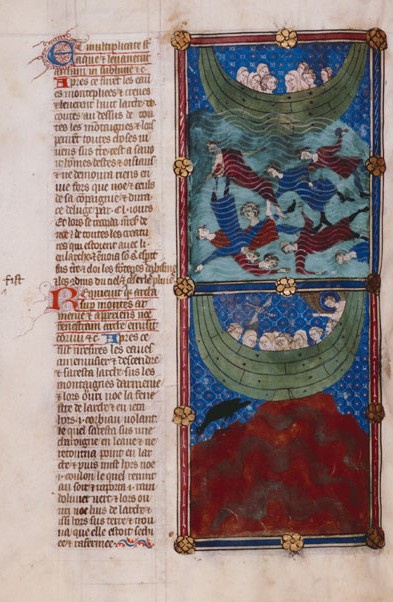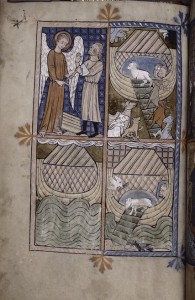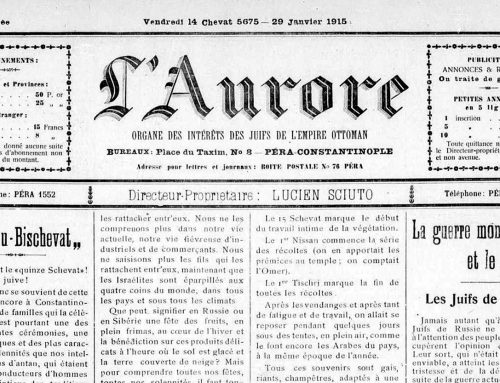Editor’s note: David Montgomery, a UW professor of Earth and space sciences and MacArthur Fellow, is publishing a new book entitled, “The Rocks Don’t Lie: A Geologist Investigates Noah’s Flood” (W.W. Norton). Hailed in early reviews as “provocative” and “surprising,” Montgomery’s book explores faith and science through the lens of geology. His compelling consideration of creation stories is sure to land on many fall must-read lists; indeed, he may have invented a new field: geology-theology!
A recent UWToday news story profiled Professor Montgomery and his new book. Click here for Vince Stricherz’s article, “New book explores Noah’s Flood; says Bible and science can get along” (Aug. 14th, 2012). JewDub contributor Sarah Stroup, an Associate Professor in the Department of Classics, has posted a terrific think-piece in response to Stricherz’s article. Stroup’s reflection considers flood myths and the relationship between faith and reason, while also keeping in mind water’s significant role in the Pacific Northwest. We welcome Professor Stroup to JewDub and are pleased to offer our readers this great food (or should we say, water) for thought.
Opening the Floodgates

Illuminated manuscript, ca 1390, showing two miniatures: the Flood, and the Ark landing on the mountain. NYPL Digital Gallery Image ID: 427373
A few things here.
First of all, the notion that scientific (or any other sort of) reason and religious faith are at odds is a relatively recent one. As the author states, all of our earliest scientists were also men of faith; indeed, many scientists (and people of reason) continue to be people of faith. Even before we get to the Christian period (and more on this momentarily), when “faith” came to mean something it did not in the prior periods, our earliest western scientists—the presocratic philosophers, who were essentially physicists—did not seem to take an inimical view toward the state religion. Xenophanes did reject the Homeric / anthropomorphic view of the gods, recognizing that men make gods in their own image (“But mortals suppose that the gods are born (as they themselves are), and that they wear man’s clothing and have human voice and body”
[frag. 5] and “if cattle or lions had hands, so as to paint with their hands and produce works of art as men do, they would paint their gods and give them bodies in form like their own-horses like horses, cattle like cattle” [frag. 6]), and posited rather a single, formless god that “sets in motion all things in mind and thought” [frag. 3] but he did not reject the idea of a god or the rituals associated with such.
There was no need to. Reason and faith (or ritual religious practice) are not at odds, but not because “maybe there’s some truth to the texts.” Rather, they are not at odds because they do not aspire to the same ends.
Science seeks to explain the world around us; religion and its practice seek to explain our ethical and social and (sometimes) psychological and spiritual role in this world.
And so, to faith. The Christian focus on “faith”—or “belief,” whatever that means—changed the game somewhat. But only for literalists, and biblical literalism is a predominately (if not entirely) New World Protestant phenomenon. Oh yes, Galileo—and also my favorite heretic, Giordano Bruno. The former merely imprisoned, the latter executed, for annoying the Church, but come on: the Church was imprisoning and executing people back then like a pope blessing babies. For the most part, Church and Science were not at odds, this occurring only when the Church—that is, the government—found itself directly threatened.
New World Biblical literalism changes all of that, precisely because New World Protestants came here with the Book they considered Holy but without the millennia of history and philosophy and enquiry and *science* with which it had always been enriched. And so, this text itself became their history and philosophy and science, and their “faith” suddenly became faith in the unerring word—not the unerring moral or spiritual word, but the unerring historical and scientific word—of this book, with the penalty for not accepting this word as damnation.
A result was not only that enquiry sort of went out the window, but also that whereas prior to a period of literalism, rejection of the ethical teachings and spiritual belief of this book meant merely a kind of eternal torture for the soul, a literalist reading means that rejection of the history and science of this book (which was never written as either history or science) results in the real and physical torture for the body. In essence, metaphor and allegory, the two strengths of both the Hebrew and Christian Bibles, went out the window, and these texts began to be used for a purpose they could not possibly have been written to fulfill.
It is as ridiculous as trying to make Darwin’s The Voyage of the Beagle into an ethical treatise.
To my second point: in spite of Dr. Montgomery’s (apparent) claims, the Flood Myth is virtually universal. Further, the notion that flood myths in the PNW and the Pacific Islands likely come from inundations after tsunamis is unfounded, unprovable, and completely missing the point. Were there possibly, in our past, seismic sea waves of considerable force that devastated areas of our coastline and the Sound? Yes, and not only possibly! We know of one, triggered by an earthquake in the Sound, dating to ca 900 CE. And yet, although seismic activity around the Pacific Ring of Fire is far from uncommon, the perfect storm of a cataclysmic seismic event and corresponding ocean and littoral conditions means that seismic sea waves in our area are relatively rare. How rare? One hits the coast about every 300 to 600 years. Thanks to our Sound, inland effects of such seismic events are remarkably rare.
But in addition to the exceeding rarity of such SSWs—both in the PNW and in the Pacific Islands—Dr. Montgomery appears to ignore the fact that many of the myths of native populations in North and Central America, as well as those throughout the Australasia and the Pacific Islands, involve Gilgamesh / Noah / Deucalion and Pyrrha-type deluges—sometimes even with the detail of one man and one woman surviving on a mountaintop or boat, the later progenitors of a “new race”—and not waves or sudden and unexplained increases in water levels.
Here’s the thing: searching around for a historical event which might have served as the “seed” of a myth misses entirely the point of how myth, as an intimately human creation, functions.
This is as silly as trying to find “Troy” in the hopes that behind the unspeakable poetic genius of Iliad and Odyssey there is some “truth.” Is it not enough that War and Return (which could be alternate titles for each, respectively) were—and continue to be—universal enough human experiences to merit their own myths? Can these myths be validated—or valued—by science only if they are based on a far-off historical event? (And if you are looking for ancient Wars and Returns, look no further: Yes. They happened. Satisfied? Are the poems more meaningful now?) As a professor in the Humanities, I find something intensely disturbing—and frankly depressing—about those who would seek to remove all of the magic—and by this I mean the marvel of human artistic creation; the simple brilliance involved in using words as a means of creating worlds—of a myth by trying to ground it in historical fact.
Also: there are several African flood myths—many of these again containing the detail that most humans were destroyed in the flood, and one or two righteous ones survived and repopulated the earth—so I am not exactly sure what Dr. Montgomery has in mind when he claims that these do not exist.
How about this for an explanation of the Flood Myth? People need water. They need it pretty much for everything: for drinking, sure. For cultivation, without which food of any type becomes almost impossible. In some places, yearly floods are necessary for survival. In other places, water is necessary for moving around safely or quickly, and provides food of its own. Water is good! It’s great! It’s most of what we’re made of! It’s absolutely necessary for the survival of any life! (Witness our excitement when we detect traces of water on Mars, or on the moons of Jupiter.) As Pindar wrote: “Water is Best!” [Olympian1.1]

Four flood scenes in miniature, ca 1320: Noah told to build the ark; Ark being loaded; Flood; Ark being unloaded. NYPL Digital Gallery Image ID: 427117
But water is also unpredictable. Not enough will kill you and destroy your crops, but so will too much.
My dad, who was a physicist (and an oceanographer) was once talking with me about water. He said: “Imagine if alien intelligence came to our planet and asked us: “What’s the most important thing to you, the one thing you can’t do without?” Humans would have to answer: “Well, it’s water. We’re mainly composed of it; we need to drink it regularly or we fall swiftly ill or die; we need it for all of our agriculture, without which we’ll starve and die again; we need it for hygiene, to keep ourselves and our cities safe; we need it to put out fires; we can use it to create energy.” The alien beings would likely say, “My goodness! What an incredibly valuable thing! How do you get it? Where does it come from? This must be exceptionally rare and expensive!” And we’d have to answer: “Well… No. It falls from the sky, and covers most of our planet.”
(And some people, Seattlites I mean, complain about the former non-stop.)
We tell myths about floods not because there were massive floods. We tell myths about floods because water is the most important thing to us. We need it and fear it and it continues to control us far better than we control it. Isn’t this myth-worthy?
And isn’t this the reason for so much strife in the modern Middle East?
Want to see more articles like this? Sign up for our newsletter!
⇒ Learn more about the Stroum Center for Jewish Studies at the University of Washington, our Sephardic Studies Program, or our Israel Studies Program.
Note: The opinions expressed by faculty and students in our publications reflect the views of the individual writer only and not those of the Stroum Center for Jewish Studies.

Illuminated manuscript, ca 1390, showing two miniatures: the Flood, and the Ark landing on the mountain. NYPL Digital Gallery Image ID: 427373
A few things here.
First of all, the notion that scientific (or any other sort of) reason and religious faith are at odds is a relatively recent one. As the author states, all of our earliest scientists were also men of faith; indeed, many scientists (and people of reason) continue to be people of faith. Even before we get to the Christian period (and more on this momentarily), when “faith” came to mean something it did not in the prior periods, our earliest western scientists—the presocratic philosophers, who were essentially physicists—did not seem to take an inimical view toward the state religion. Xenophanes did reject the Homeric / anthropomorphic view of the gods, recognizing that men make gods in their own image (“But mortals suppose that the gods are born (as they themselves are), and that they wear man’s clothing and have human voice and body”
There was no need to. Reason and faith (or ritual religious practice) are not at odds, but not because “maybe there’s some truth to the texts.” Rather, they are not at odds because they do not aspire to the same ends.
And so, to faith. The Christian focus on “faith”—or “belief,” whatever that means—changed the game somewhat. But only for literalists, and biblical literalism is a predominately (if not entirely) New World Protestant phenomenon. Oh yes, Galileo—and also my favorite heretic, Giordano Bruno. The former merely imprisoned, the latter executed, for annoying the Church, but come on: the Church was imprisoning and executing people back then like a pope blessing babies. For the most part, Church and Science were not at odds, this occurring only when the Church—that is, the government—found itself directly threatened.
New World Biblical literalism changes all of that, precisely because New World Protestants came here with the Book they considered Holy but without the millennia of history and philosophy and enquiry and *science* with which it had always been enriched. And so, this text itself became their history and philosophy and science, and their “faith” suddenly became faith in the unerring word—not the unerring moral or spiritual word, but the unerring historical and scientific word—of this book, with the penalty for not accepting this word as damnation.
A result was not only that enquiry sort of went out the window, but also that whereas prior to a period of literalism, rejection of the ethical teachings and spiritual belief of this book meant merely a kind of eternal torture for the soul, a literalist reading means that rejection of the history and science of this book (which was never written as either history or science) results in the real and physical torture for the body. In essence, metaphor and allegory, the two strengths of both the Hebrew and Christian Bibles, went out the window, and these texts began to be used for a purpose they could not possibly have been written to fulfill.
It is as ridiculous as trying to make Darwin’s The Voyage of the Beagle into an ethical treatise.
To my second point: in spite of Dr. Montgomery’s (apparent) claims, the Flood Myth is virtually universal. Further, the notion that flood myths in the PNW and the Pacific Islands likely come from inundations after tsunamis is unfounded, unprovable, and completely missing the point. Were there possibly, in our past, seismic sea waves of considerable force that devastated areas of our coastline and the Sound? Yes, and not only possibly! We know of one, triggered by an earthquake in the Sound, dating to ca 900 CE. And yet, although seismic activity around the Pacific Ring of Fire is far from uncommon, the perfect storm of a cataclysmic seismic event and corresponding ocean and littoral conditions means that seismic sea waves in our area are relatively rare. How rare? One hits the coast about every 300 to 600 years. Thanks to our Sound, inland effects of such seismic events are remarkably rare.
But in addition to the exceeding rarity of such SSWs—both in the PNW and in the Pacific Islands—Dr. Montgomery appears to ignore the fact that many of the myths of native populations in North and Central America, as well as those throughout the Australasia and the Pacific Islands, involve Gilgamesh / Noah / Deucalion and Pyrrha-type deluges—sometimes even with the detail of one man and one woman surviving on a mountaintop or boat, the later progenitors of a “new race”—and not waves or sudden and unexplained increases in water levels.
This is as silly as trying to find “Troy” in the hopes that behind the unspeakable poetic genius of Iliad and Odyssey there is some “truth.” Is it not enough that War and Return (which could be alternate titles for each, respectively) were—and continue to be—universal enough human experiences to merit their own myths? Can these myths be validated—or valued—by science only if they are based on a far-off historical event? (And if you are looking for ancient Wars and Returns, look no further: Yes. They happened. Satisfied? Are the poems more meaningful now?) As a professor in the Humanities, I find something intensely disturbing—and frankly depressing—about those who would seek to remove all of the magic—and by this I mean the marvel of human artistic creation; the simple brilliance involved in using words as a means of creating worlds—of a myth by trying to ground it in historical fact.
Also: there are several African flood myths—many of these again containing the detail that most humans were destroyed in the flood, and one or two righteous ones survived and repopulated the earth—so I am not exactly sure what Dr. Montgomery has in mind when he claims that these do not exist.
How about this for an explanation of the Flood Myth? People need water. They need it pretty much for everything: for drinking, sure. For cultivation, without which food of any type becomes almost impossible. In some places, yearly floods are necessary for survival. In other places, water is necessary for moving around safely or quickly, and provides food of its own. Water is good! It’s great! It’s most of what we’re made of! It’s absolutely necessary for the survival of any life! (Witness our excitement when we detect traces of water on Mars, or on the moons of Jupiter.) As Pindar wrote: “Water is Best!” [Olympian1.1]

Four flood scenes in miniature, ca 1320: Noah told to build the ark; Ark being loaded; Flood; Ark being unloaded. NYPL Digital Gallery Image ID: 427117
But water is also unpredictable. Not enough will kill you and destroy your crops, but so will too much.
My dad, who was a physicist (and an oceanographer) was once talking with me about water. He said: “Imagine if alien intelligence came to our planet and asked us: “What’s the most important thing to you, the one thing you can’t do without?” Humans would have to answer: “Well, it’s water. We’re mainly composed of it; we need to drink it regularly or we fall swiftly ill or die; we need it for all of our agriculture, without which we’ll starve and die again; we need it for hygiene, to keep ourselves and our cities safe; we need it to put out fires; we can use it to create energy.” The alien beings would likely say, “My goodness! What an incredibly valuable thing! How do you get it? Where does it come from? This must be exceptionally rare and expensive!” And we’d have to answer: “Well… No. It falls from the sky, and covers most of our planet.”
(And some people, Seattlites I mean, complain about the former non-stop.)
We tell myths about floods not because there were massive floods. We tell myths about floods because water is the most important thing to us. We need it and fear it and it continues to control us far better than we control it. Isn’t this myth-worthy?
And isn’t this the reason for so much strife in the modern Middle East?







Leave A Comment